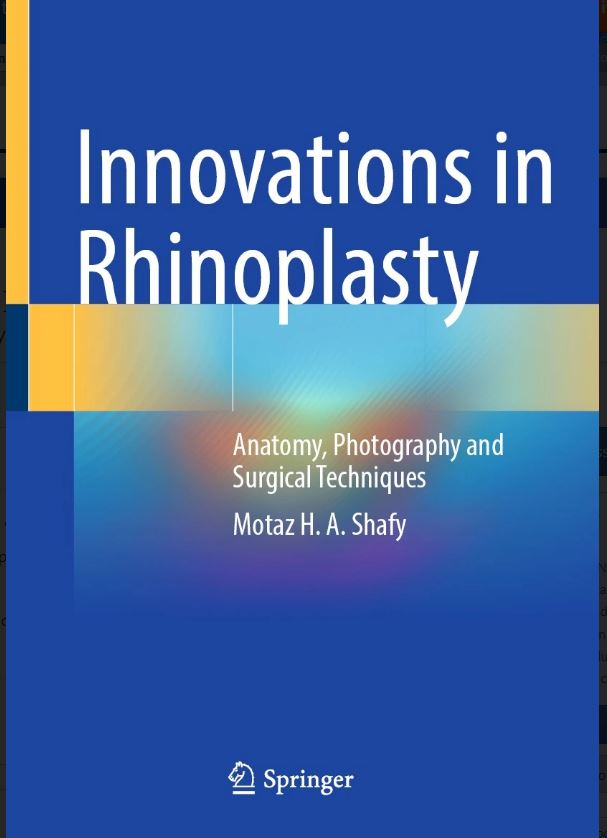Review by R Gohil
Edinburgh, UK
Teaching in rhinoplasty has really come on over the last few years with tips on the formidable subject being delivered through a host of different media. Be it from traditional outlets such as cadaveric courses and fellowship programmes, all the way to Zoom live surgery events and social media. Nonetheless, the traditional methods continue to be the most effective and to that end, an abundance of textbooks has been published on the subject in recent years. These have ranged from instructional texts on surgical technique, to retrospective works looking back on the authors’ developing results over time.
Dr Motaz Shafy is based in Giza, Egypt, and his offering to the rhinoplasty literature is a useful addition to this growing library.
In its first edition and published by Springer, the content of the book has all been collated by Dr Shafy himself. A lot of the influence in the examples that he uses comes from the specific population that he serves, however the content translates across to the global audience seamlessly.
This hardbound book is presented over 401 pages and divided into three parts: 1. Clinical Varieties of Rhinoplasty; 2. Rhinoplasty Photography for Surgeons; and 3. Surgical Techniques.
The first part takes a detailed look at the minute and extremely complex anatomy and interactions of the components of the external nose. Dr Shafy has taken the time to present concepts such as the weak areas and soft folds of the nose, their relevance to the patient’s problems, their surgical importance and their influence on the functionality of the nose. He also mentions novel structures such as the inferior vestibular band and vestibular septum. The concepts are addressed in a way that the reader revisits them time and again through the chapters, cementing these ideas in their mind. A chapter is also dedicated to different skin types and how they vary depending on the area of the nose, alongside surgical considerations in these cases – this is something that I found equally fascinating and relevant.
The second part covers photography in rhinoplasty, which is ever more important from a medicolegal perspective. Tips on the ideal equipment, setup and standardisation of photographs are given. Further time is given to the significance of light reflexes of the nose and certainly this information has given me further insight for when I am scrutinising clinical photographs myself.
Finally, no rhinoplasty text would be complete without an overview of surgical techniques. What this book additionally offers is an overview of the difficulties experienced by the author in rhinoplasty surgery, different non-surgical scenarios that can lead to a poorer outcome and how these can impact not only the patient, but the surgeon’s psychology. I felt that this was a very candid series of chapters and something that readers can draw a lot from.
This book is well presented with clear, well delivered passages that are easy to digest. The text is interspersed with good quality coloured clinical photographs that clearly illustrate the points being made. I personally felt that I had a lot to take away from this book to apply to my own work and would recommend it to those fostering an interest in rhinoplasty surgery or who are indeed established themselves.
Amazon Link: Innovations in Rhinoplasty: Anatomy, Photography and Surgical Techniques
By purchasing books via this link you will help to fund the JLO

